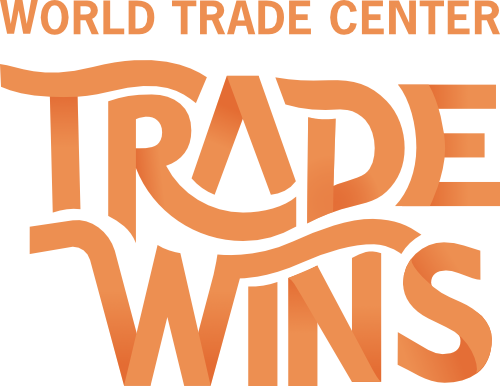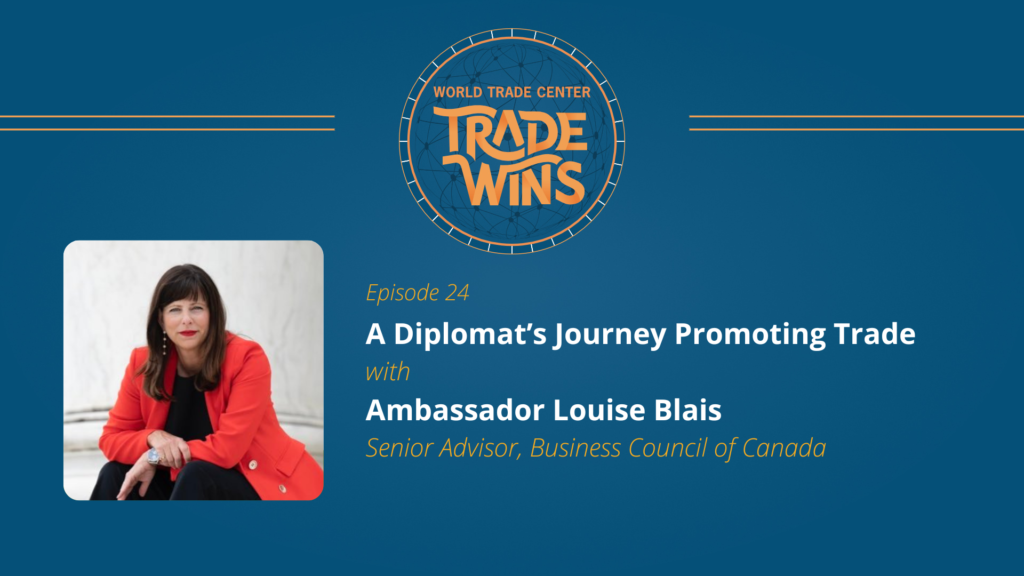Robin van Puyenbroeck 0:07
Welcome back to Trade Wins. I’m Robin Van Puyenbroeck, your host, and my guest today is Ambassador Louise Blais, who was the former Deputy Permanent Representative to the United Nations here in New York and most recently the Consul General for Canada in the state of Georgia. So Louise, welcome to the show, and it’s so good to see you again.
Louise Blais 0:28
It’s wonderful to be here with you, Robin. Thank you for inviting me.
Robin van Puyenbroeck 0:32
Yeah, of course. We saw each other last in Savannah, right in Georgia, so I wanted to go back to your work there but before that – how is life after the diplomatic service?
Louise Blais 0:45
In a way, it’s a big change, I’ve been a diplomat for close to 30 years and representing my country. But what I have found since I left is two things. One is I’m still able to support Canadian trade in my new role. So that’s very satisfying. And second, I have more freedom to say what I want to say and the bureaucracy can be wonderful. It can couch you, it can protect you, but at the same time, it can limit you and so in my new role, I feel that I’m able to be much more outspoken on social media and really push the agenda of international trade for Canada. But as well, I’m very active on issues related to the UN, in particular now with the conflict in Europe.
Robin van Puyenbroeck 1:34
Yeah, of course. We’ll talk about that because it’s naturally interrelated. Although, you have a fascinating career, but there’s a big difference working as a diplomat on the multilateral level within the UN context, and here in New York, versus on a more bilateral basis, especially when you were in Georgia, very much “boots on the ground,” so to speak, and being involved with the private sector and working promoting Canadian trade. How was that experience different? Because it does come back together to what you just said, the question of how do we solve the problems today that are trade-related or conflict-related? Where governments are involved, but from a professional perspective of working in a multilateral environment versus bilateral with a focus more on business, how was the experience for you different?
Louise Blais 2:23
It was a very big learning curve. And really, to be honest, when I was asked to go in and support the campaign, the Canadian campaign for the Security Council, I still had a year to go on my Consul General job in the southeast and President Trump had just been elected and a lot of the cabinet ministers came from my territory. So, I really honestly, I resisted because I felt comfortable in this environment, I knew the players and then I was going to be catapulted into the UN multilateralism. And we have diplomats who do this as a career, they really basically go from one multilateral office to another. It wasn’t my case, I’d focused on bilateral relations my entire career. So I have to honestly say I was intimidated. And when you arrive at the UN, it is the Olympics of diplomacy – the world is there, countries with whom you have more difficult, challenging relationships are there and you have to interact. The complexities are just layers and layers and layers, not just from the rules of procedures perspective, but just developing — just a silly thing is this, it’s just to know the first name of all 193 ambassadors because you encounter them on the end, the deputies, and so you have to be on top of your game all the time. And you have to know, not just what that country is doing in the multilateral context, but what’s the relationship – the Canada, US, Canada, Polish relationship, Canada, India relationship? It’s a myriad of complexities. And you add on top of that, of course, a campaign from the Security Council – it was enormously challenging andthe hours were basically 24/7. The pace at the UN now is almost inhuman because the meetings have multiplied, so they just keep adding new meetings, but they don’t take any other things away. And so, you really, really have to take a deep breath and go all in, but it was a fantastic experience. And then while I was there, one of the reasons why they thought it’d be a good choice is that Canada was trying to bring in the private sector and to achieve the Sustainable Development Goals. We realized that there is no way that the UN system on its own, or even aid money, is going to get us to the trillions that we need to achieve the SDGs. And Canada was at the forefront of bringing the private sector inside to UPenn, which was something that really hadn’t been done. We had the IMF, that’s not the private sector. And so we focused a great deal on that in my time there. So there were definitely linkages. And of course, my knowledge of the United States – and Nikki Haley was governor of South Carolina when I was in the southeast, and now she’s the ambassador, – knowing how to deal with the Americans at the UN is also an asset to be sure.
Robin van Puyenbroeck 5:28
They’re very interesting. Yeah, no, I mean, there’s of course, this notion that the UN is very imperfect but if it didn’t exist, we would have to invent it. Do you still agree with that?
Louise Blais 5:41
I do. I do. There are things I really do believe that we need to take a hard look at. And there have been some changes done recently – there was a resolution that was passed by consensus in the General Assembly, to ensure that any country using a veto would have to explain itself back in the General Assembly. Which, ultimately, the General Assembly is the sovereign body of the UN. But over time, and it’s not necessarily in the charter, but over time, we let the Security Council run the show. And I think there’s dissatisfaction, growing dissatisfaction with that, but I’m optimistic about some of the changes that could be afoot. But before I finish this answer, I just want to add that there is one thing that the UN does extremely well. It’s the funds and programs and the agencies. The World Food Programme, the refugees, UNICEF. Without us knowing, us the donor countries, we really need to appreciate more the lives and the livelihoods that those organizations have made better over the past 75 years of the existence of the movement. A big shout out for the agencies.
Robin van Puyenbroeck 7:31
Yeah, no, no, that’s important that you also mentioned that because when we look at it, these are the agencies that are then on the ground when there are issues with global warming, or when there’s of course refugees because of conflict, or I was just talking with someone else earlier this morning about why people migrate, right? It’s not just for a pure economic opportunity or conflict, now it’s also because there’s food insecurity. And then there are climate refugees. So, maybe to put your hat on from when you were in the southeast more focusing on sort of the business community, if you look at what’s going on, in the current global trade environment there’s of course conflict, but there’s inflation at very high levels, reaching double digits in many places. And there’s also this notion of a terrible food crisis upon us. What I mean, we know we came out of the pandemic, and then there’s, of course, there’s conflict, and these things happening, but it seems to be like a perfect storm. So Canada is a bit of a, I would say, correct me if I’m wrong, but at least from the outside, a bit of a safe haven in this big storm. But how would you with your experience, like working with companies or working with government, like, how can we address this tremendous imbalance, when we look at a trade when you have so many people that will just be from basic goods? And it goes from the terrible situation and in many places in Africa where there’s simply no food available, but even to the U.S. where the Air Force has to fly in infant formula because the factory shuts down. So there seems to be, from a supply chain perspective, from so many different angles, that things are very confusing right now. So what do you make of what’s happening today and the trade environment?
Louise Blais 9:11
I think you’re correct to say that we’re facing, unfortunately, a perfect storm of different geopolitical challenges that are congregating and coming at the same time, and I think that’s making things extremely difficult. What I’m hearing from companies is a variety of threats. Some of them you mentioned, some of them you haven’t mentioned – cybersecurity is a huge one out and companies admit themselves that they’re ill-equipped to fully ward off what could be devastating attacks on their system. Which would further make their supply chain more complicated. Or, we look at what happened with the pipeline in the northeast and southeast last year, it’s a perfect example. When, a necessity, a commodity, that you cannot live without completely goes dry because of an accident, whether it’s man-made or whether it’s natural. So the way I see it is two ways. First of all, we’re at a point, an inflection point, I think, where I don’t think we can take on too many more of these destabilizing forces. I think we can deal with what we have now. But the war in Europe was really ill-timed. And you could argue that President Putin timed it that way. But the fact that now grain can’t flow out of that region that used to feed, basically, most of Africa and regions in Southeast Asia, that’s a big problem. But I’m optimistic at the same time because I was just speaking yesterday with the Ukrainian Ambassador to Canada and she was saying that they have gone out of their way in Ukraine, despite being at war, to reopen some of these ports, and to be able to ship some of those commodities again. But she did mention that if Odessa falls, then that’s game over. Everything is really borderline, we could probably muddle through some of these things that are happening. But at the same time, I don’t think we can take on much more. And now you have more and more companies talking about reshoring, nearshoring, bringing, bringing supply chains back. And it’s a big change. I mean, we constructed the past 30 years. We globalized in every way. And now we’re realizing, well, we took some things for granted in terms of some of the partners in which we decided to do business with, shouldn’t include it.
Robin van Puyenbroeck 11:41
This notion of reshoring, or nearshoring, of course, has been on the agenda for many companies for pure economic reasons for a while to just make sure there’s no disruption in supply chains for whether it’s workers falling sick because of COVID, to just a lack of certain resources and a costing perspective, all of that has changed as well, of course. And so, talking about the nearshoring, I think it’s a very interesting question like how, because there are, of course, very strong trade ties between Canada and the United States. But how do you see the sort of the Inter-American trade opportunity, and then I include the entire continent,from the south of the tip of Argentina and Chile all the way up to Canada, because I believe the Inter-American, Intra-American trade is, I believe, around 50% of exports, which is a good 10 basis points less than in Asian, 20 less than in Europe, where it’s about 70%. How do you see also historically why there seems to be a disconnect between better and more trade within the Americas – because it’s a massive market. So why is this so difficult?
Louise Blais 12:50
I welcome that question very much, because it’s something that I’ve been speaking a lot about with Canadian and American government officials, on this issue of the lens by which we have seen Central and Latin America, even the Caribbean, which has always been not as equal partners, and our eyes went towards Europe, obviously and towards Asia. And yet, we have a lot of the solutions in our own hemisphere — whether it’s raw material, whether it’s oil, whether it’s grain, whether it’s critical minerals, we have a lot of the answers — but we are facing, instead of and embracing this as a solution moving forward, I can tell you from the perspective of Canada, we’re facing a lot of protectionist winds in the United States. For some reason, the Republican Party, which used to be very pro-free trade, has a wing now that has gone very protectionist. And yes, Canada is not the target of that, per se – it’s other countries that they have in their lens but there’s collateral damage when they passed by American legislation, and that was very much included in the big hard infrastructure bill that was passed last year. Canadian companies no longer bid for some of those infrastructure contracts, which will mean that the projects will be delayed and will cost more because they just simply don’t have the capacity to unroll all those billions of dollars at the same time across the country. And Canada can help in this area. Canada has made the U.S. competitively competitive – it has made their competitive advantage better because what we sell the United States is not final products by and large. What we sell them is components that go right into their own manufacturing economy and so they’ve relied on us but it’s unfortunately not recognized and so you end up with with with knee jerk policies that get passed or like the EV tax credit that would have excluded Canada – it didn’t pass because Senator Manchin didn’t support it, and we dodged a bullet there. But that would have had not just have an impact on Canada, but an impact on the United States because the automobile industry is very much integrated as a result of NAFTA and USMCA. So we as Canadians have to do a better job at telling that story south of the border – the United States is a superpower that can get distracted, it has a lot on its plate. And so it’s up to us, I think, to come to them with solutions, and to just keep re-emphasizing that we’re stronger together continentally than we are if we go at it alone. And you look at the immigration problem that they have – their southern border, part of that could be solved by doing greater trade and investment in countries like Guatemala, and many others. And so these countries are ready to work. Colombia is another example. And they’ve got the labor force. And right now it’s China that’s investing.
Robin van Puyenbroeck 16:03
Yeah, what we see with our World Trade Center Network in the Americas, there’s a tremendous amount of ongoing conversation. And this is really where you see, and I’ll come back to your work in the southeast, this is a people to people business to business type of conversation that’s happening every day. And maybe, again, to go back to your work here. When you were in the southeast as a Consul General. How practically, then, when you are on the grounds, how then do you make that happen? All the things that you’re talking about sort of, I’m not gonna say like what does the day look like, but can you give like a very concrete example of how you create those opportunities for businesses while you were doing your work as a diplomat, working with companies, of course, promoting your work for Canada, but obviously, it has an impact way beyond the U.S- Canada sort of trade corridor? So can you share some of the most dramatic anecdotes or examples of some of the things that you did where this is how that works in real life?
Louise Blais 16:59
Well, it’s so varied, but a few examples come to mind. We, of course, have a Trade Commissioner Service, and we help businesses actually grow their export market in the United States. And we try to attract FDI, from the United States into Canada, really, that’s the focus. But in order to achieve that, you sometimes have to – it’s not a direct route, you kind of have to do a dance to get to that, that and, and so some of the things we did, for example, when I was Consul General is recognizing that Canadian and American women leador women-owned SMEs, were more reluctant in general, to grow into exporting. So they kind of get satisfied with their domestic market and they play for keeps. I’m generalizing, but it’s a proven data point. We organized a trilateral Canada, United States, and Mexico conference of women in business, and we brought in many of the big fortune 500 companies. And we, because they’re looking to diversify their supply chain, they want more women, more minority owned supply chains, that’s why many of them have that in their objective. And they conducted a training session – how do you pitch? And how do you promise to be able to scale up your business to take a big contract with Coca-Cola, UPS, or Home Depot. And so that was a very concrete way in which we developed exports. But another indirect way was negotiating and having a reciprocal agreement that when expats from Canada, and Georgia, for example, go back and forth to Quebec and Ontario, that their driver’s license could be automatically exchanged.
Robin van Puyenbroeck 18:55
Of course, very practical. Yes.
Louise Blais 18:57
It’s practical, but it makes a difference when you’re bringing in top CEOs and executives. And they don’t have to go and take the course and spend two weeks trying to get a driver’s license. So those are all the little things that we do. And then the big thing is – I must have met with elected federal and state level officials, probably 10 times a week, both in state and up in Washington .It’s important to go see them, talk to them, make sure they don’t forget Canada, make sure they’re well aware of some of the things they’re considering legislating on and the impact.
Robin van Puyenbroeck 19:34
How can one ever forget about Canada?
Louise Blais 19:36
Well, you’d be surprised. President Biden recently said when he hosted Prime Minister Trudeau, “Oh, Canada, that’s the one country I don’t have to worry about.” But that tells a lot.
Robin van Puyenbroeck 19:49
That sums it up, right? That sums it up. That’s great. Well, thank you so much. And so now you’re out of the service, so what keeps you busy these days?
Louise Blais 20:00
Well I’m continuing to do this kind of work we’re what we’re importing the visit to Canada, from Curiosity Lab at Peachtree Corners – we’re coming to Ontario next week and meeting with government officials and businesses to establish partnerships. And still involved with Savannah – I left my heart in Savannah – and so continue to work with CDOT and World Trade Center Savannah. There’s a lot – they just announced a wonderful Canadian company, CAE, is going to extend their operations in the area with a training center for simulators. And so, lots to do! There’s so much growth still in that relationship and so I’m happy plugging away at it.
Robin van Puyenbroeck 20:40
That’s great. And I’m sure you’ll continue to be very successful there. So that’s it, Ambassador Louise, thank you so much for joining us here on the show. I very much appreciate it. Thank you.
Louise Blais 20:50
Thank you, Robin.
Robin van Puyenbroeck 20:52
If you have any ideas for future episodes, know someone who would be an inspiring guest, or just want to stay apprised of our show, please make sure to connect with our team via email at podcast@wcta.org. Be sure to head over to podcast.wtca.org and subscribe to the show. We will see you soon.






